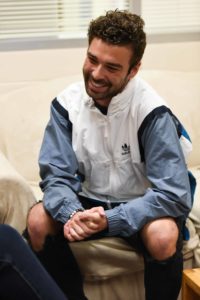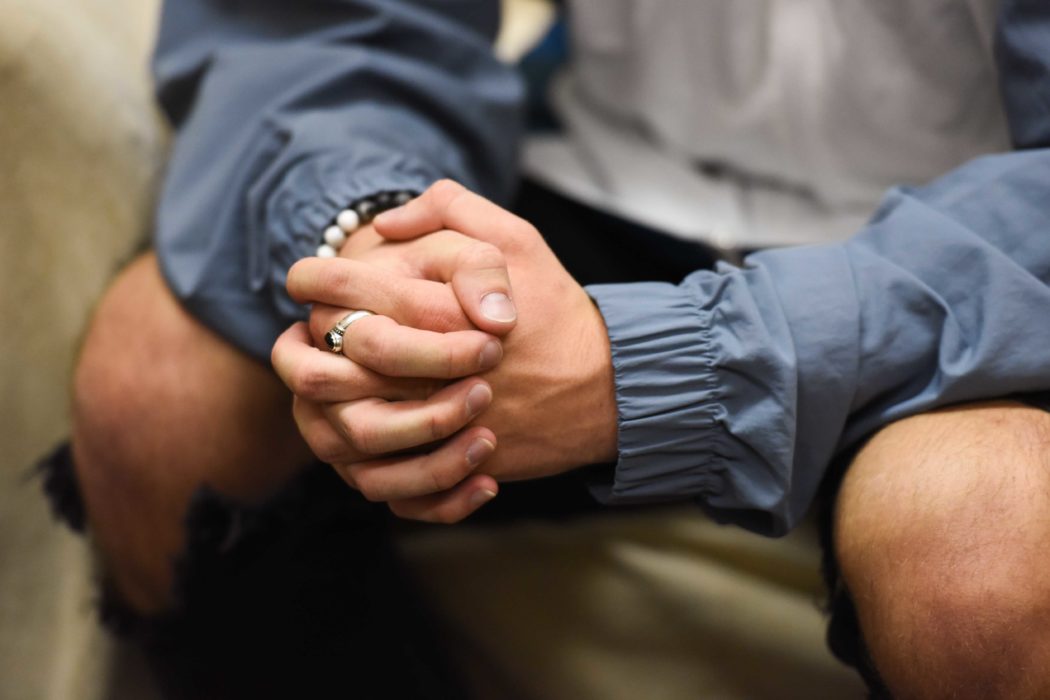‘Things weren’t perfectly perfect in everyone’s life:’ USUSA VP opens up about personal mental health struggles
Joe Aratari was a sophomore at Herriman High School when he started severely struggling with mental health.
Aratari is a junior majoring in communication studies, and he is the current student events vice president for the Utah State University Student Association.
He went to middle school in Riverton, but had to break from his friends to attend Herriman High School. Though the cities are only about five miles apart, the change was more difficult for Aratari than he expected.
“I started noticing I didn’t really know who I was,” he said. “I was trying to figure that out and kind of got down in the dumps.”

Joe Aratari talks to Utah Statesman reporters about working through his depression.
Toward the end of his sophomore year, Aratari was diagnosed with depression, which led him to start seeing a counselor and taking medication. He took breaks during the school day to attend therapy sessions, but never faced criticism from his teenage classmates.
“I think it was good for them to know that things weren’t perfectly perfect in everyone’s life,” he said. “I think that was really valuable because in high school, and even in college and in life, we don’t really know what’s going in people’s lives, and we can see them as living this great life, but you don’t really know what’s going on.”
Though he attempted to hurt himself once, he received help immediately and made his way through high school taking his mental health struggles on a day-by-day basis.
But things changed when he moved to Logan to attend USU.
“Your roommates become your friends and your family as well, and you kind of have to grow a support system and connect with other people and, once again, figure out who you are and who you want to be on a different level,” he said. “It’s definitely scary.”
As a freshman, he applied for a position in the student events office, and was placed on the USUSA activities committee, which he attributes as a major source of his happiness and success at USU.
After two years working on various committees in the student events office, Aratari ran for USUSA student events vice president, and after a tough election, knew he needed to seek help.
“I realized it was getting to a point where I needed to start talking to someone again,” he said.
Though his position as a vice president has been incredibly rewarding, he said, with tears falling from his eyes, his depression sometimes makes it difficult for him to support his three directors in their work. But he communicates when he’s struggling and said they’re always understanding.
“I think it’s made me more vulnerable and more of not just a boss or the vice president,” he said, but “their friend and understanding coworker.”
Though many people he’s met through student involvement have impacted his life, Aratari said Felicia Gallegos, his best friend and a former USUSA activities director, has made the largest difference in his time at USU.
“She’s incredible. I cannot express the amount of love that I have for Felicia.” He said. “She’s been there for me every day since the first day I walked into that office my freshman year.”

Felicia Gallegos talks to Utah Statesmen writers about her friend Joe Aratari who she had helped with his depression.
Gallegos, the outreach and advocacy specialist at the Sexual Assault and Anti-Violence Information office, said seeing Aratari grow through his time at USU has been rewarding for her, and the two have built a support system through one another.
Almost weekly, she said, the two will go to Starbucks and then drive around listening and screaming to Rihanna’s “Higher.”
“It’s two minutes exactly of the greatest lyrics. They don’t make any sense, but we will blast it and just scream it,” Gallegos said. “We don’t sound pretty at all, but that’s our moment.”
Though Aratari’s position focuses primarily on overseeing events, he ran hoping to make a difference for others and pass on what he said has been given to him.
“It’s been very motivating and encouraging, because I see the struggles that I’ve been through, and it makes me see the light at the end of the tunnel through doing involvement and becoming something more than yourself,” he said, “so for me to be able to provide that for others and see others also be going through anxiety and depression and other mental health and physical health needs, I think it’s really motivating for myself to be an example in a way.”
Aratari added that college can take a mental and emotional toll on students, but it is worth it in the end.
“There always comes that time when you get in your head a little more than usual and wonder if it’s worth it,” he said. “I think at the end of the day, it’s important to remember that it always is.”
@Alison__Berg

